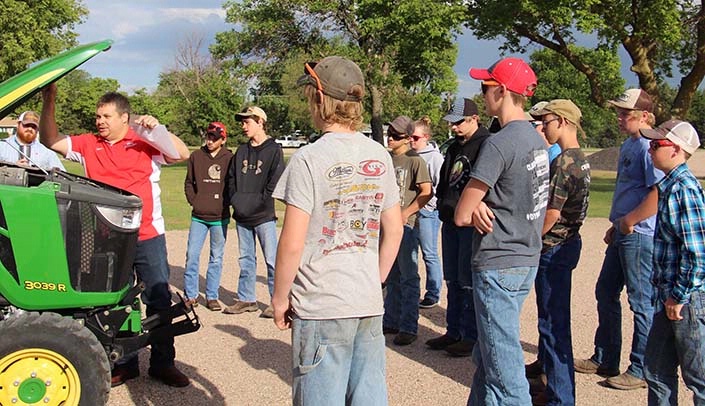Teens across Nebraska are learning how to avoid getting hurt or worse when working with farm machinery.
The program is part of a partnership with UNMC’s College of Public Health, Nebraska Extension Tractor Safety & Hazardous Occupations Courses and the U.S. Department of Agriculture with funding from the Central States Center for Agricultural Safety and Health.
Farming is known as one of the most dangerous professions. The most common cause of agricultural-related death in Nebraska is overturned tractors and all-terrain vehicles (ATVs). Extensive training on tractor and ATV safety occurs during in-class lessons with hands-on activities. Instilling an attitude of ‘safety first’ and respect for agricultural equipment are primary goals of the course.
Aaron Yoder, Ph.D., and Ellen Duysen are providing tractor safety courses in June and July in nine cities across Nebraska.
Teens in Auburn, Gering, Gordon, Grand Island, Kearney, McCook, North Platte, Valentine and Wayne are learning elements of the National Safe Tractor and Machinery Operation Program.
“We work with a wide range of students,” said Dr. Yoder, assistant professor, UNMC College of Public Health. “Some of them have little experience working with tractors and machinery, and others have been working around this type of equipment for some time. Those with less experience get to build some confidence as well as gain knowledge of the hazards that are present. More experienced students add to their operational knowledge with more safety details about the tasks they are doing.”
Federal law prohibits youth under 16 years of age from working on a farm for anyone other than parents or legal guardians. Certification received through the course grants an exemption to the law allowing 14- and 15-year-olds to drive a tractor and to do field work with specific mechanized equipment.
“It is rare to find a student who doesn’t know of someone who has been injured or killed on the farm,” said Duysen, community outreach specialist for the Central States Center for Agricultural Safety and Health. “Coming into the course, these young workers already know about many of the hazards that they will face. It is our job to send them out with a thorough understanding of how they can mitigate these hazards, through safer practices and changes to the way that they approach their working environment.”
